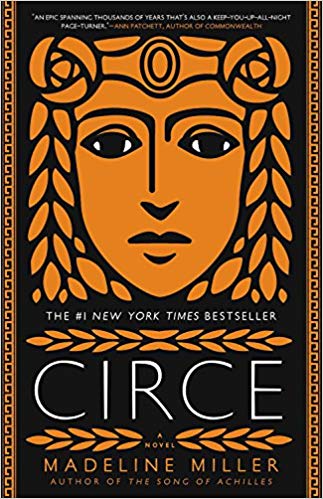Two seemingly unrelated books
In January (2019) I set out to read fifteen books by the end of the year. This might seem like a conservative goal for a self-declared bibliophile, but I think setting low expectations that can be easily exceeded yields better results than almost-but-not-quite achieving more ambitious goals. My forty book goal last year, for example, left me feeling unsuccessful given I only got to ten.
The point is that by March this year, I had already read six of the fifteen books I committed to, and there was a lot to unpack. These are the six books I read up to that point:
- Circe by Madeline Miller (fiction)
- The Song of Achilles by Madeline Miller (fiction)
- American Gods by Neil Gaiman (fiction)
- The Soul of a New Machine by Tracy Kidder (biographical)
- The Prince by Niccolò Machiavelli (philosophy/political science)
- Bad Blood by John Carreyrou (true crime)
You can follow my progress on this goal through Goodreads.
I strongly recommend each and every one of these books.
You may be thinking:
Wow, if this guy read six books in three months, he must’ve read twelve books by now (June).
– You, maybe.
(6 books / three months = 2 books per month; 2 bpm * 6 months = 12 books in case you want to check my math).
You’d be wrong, I’ve read seven, but that’s not the point here.
The point is that in my endless introspection I found an interesting connection (it may be more appropriate to call it an analogy) between the first and sixth book that I read in that 3 month period. This same connection led me to think about the commonly ignored dangers that come with the combination of unchecked ambition and inexperience/ignorance, particularly among those I like to call the «super entrepreneurs».
Before starting on the subject, I’d like to introduce the books that sparked this reflection.
Circe
Circe, the NYT Best Seller written by Madeline Miller, is a novel that navigates the life of, in my humble opinion, one of the most underrated characters in the Odyssey. It’s all about Circe. Circe is a sea nymph, daughter to the Titan Helios. As some may remember, Helios (the Sun) was one of the only Titans to come out of the Olympian Revolution unscathed and on the winning side (the side of the greek gods of the Olympus).
Circe, on the other hand, is better known for being Odysseus’ lover during the year that the legendary man lived on the isle of Aiaia (Aeaea?). In the Odyssey, Odysseus only spends a year with Circe, as opposed to the seven years (one for every book I’ve read this year) he spent with Calypso (another nymph who lives in another island with a name that is hard to pronounce).
Considering that Odysseus’ journey home from Troy to Ithaca (more generally known as the actual Odyssey) took a decade, it’s no surprise that such little time is spent on the nymph in question. In this novel, however, the stellar role is that of the aforementioned nymph, whose life is narrated from her own point of view, from her childhood to… Well, until the end of the part of her life that the author thought relevant. It must be difficult to write an ending to the biography of a fictional immortal being, particularly because biographies tend to end with their subject’s death.

If you know the story of the Odyssey and you’re not sure which of the women Odysseus encountered was Circe, it might help to know that she’s not the gargantuan and less-than-bright cyclops. That’s Polyphemus. If that’s not enough, Circe is the one that turns all of Odysseus’ men into swine. I apologize for the spoiler, but the Odyssey came out almost 3,000 years ago (800 A.D.), the spoiler ban has surely lifted by now.
Although Circe is by far the most interesting character in the novel (I mean, the book is called “Circe”, how would she not be?), I’m afraid a man will once more steal her well-deserved spotlight. That’s because two of the main subjects of this blog post are actually another one of her lovers and, because he is essential to the analogy, his son. If you don’t know of whom I speak, refer to the cover picture and title I chose for this blog post and you may get a better idea.
This is where I stop to inform you that, should you be the least bit interested in fantasy literature and greek mythology, it is your civic duty to run to your closest browser and order a copy (ideally a hard cover copy) of this magnificent novel.
Bad Blood
Bad Blood: Secrets and Lies in a Silicon Valley Startup, another NYT Best Seller, this one written by John Carreyrou, is the end product of the single most transcending journalistic investigation in the history of the Silicon Valley. Throughout his book, Carreyrou walks you through the process and every detail that led him to uncover what is, in my opinion, the most dangerous fraudulent enterprise that has stained the world of modern technology.
Front and center of this multi-billion dollar scandal are the privately held health technology corporation Theranos and, its CEO and founder, Elizabeth Holmes. This is a woman once praised as “the new Steve Jobs” (like that’s a compliment), turtle neck and all.

If you’re not familiar with the case of Theranos (a portmanteau of [Thera]py and Diag[nos]is) and Elizabeth Holmes, fret no more. I’m about to give you give you a brief and heavily summarized lesson on all things Theranos. If you do know the case, a little recap won’t hurt. If after reading this post you’re left hungry for more, I strongly recommend that you read Bad Blood: Secrets and Lies in a Silicon Valley Startup.
Taking flight
At the tender age of twenty-two, Elizabeth Holmes, or Lizzy, as probably no one called her, dropped out of Stanford’s undergraduate program. Holmes had started her B.S. in Chemical Engineering and had taken a job as a student researcher and lab assistant for Stanford’s School of Chemical Engineering. After successfully patenting a dermal patch that would, by some unexplained miracle, detect “biological action” and automatically administer “medical therapy” in 2003, Holmes finally dropped out in 2004.
Right after, Holmes decided to invest her tuition fund in starting a company in the health technology market where said patent, which should have never been approved, was instrumental in acquiring those early investors. Specifically, Holmes, and by extension Theranos, set out to revolutionize the way blood analysis is carried out. Their aim was to achieve this ambitious goal through the development of technology that would minimize the amount of blood necessary to successfully and reliably execute these tests. “How was she inspired to start a company like that?” you ask. She hates needles.
In a world in which having trypanophobia, as no one ever refers to the fear of needles, is enough reason to drop out of college and start a company that will eventually be worth 9 billion USD (and then become worthless overnight), there are many examples of successful entrepreneurs that share Holmes’ profile. Nowadays, most laypeople celebrate these once young (between 18 and 25) entrepreneurs who dropped out of college to materialize their unrealistic ambitions and change the world forever.
Among the most outstanding of these legendary beings you will find those you may already know. Bill Gates was twenty years old when he co-founded Microsoft. Mark Zuckerberg was nineteen when he founded what started out as “The Facebook”. Steve Jobs was twenty-one when he, together with Steve Wozniak (the real hero and genius to some of us), founded Apple. This last example holds a special significance to this blog post, given that he inspired the archetype that has dealt so much unrecognized damage to society and was, by her own admittance, the man Elizabeth Holmes sought to emulate, down to the most eccentric of his quirks. Boy, did that not work out for her.

The thing is that Gates, Zuckerberg and Jobs are what someone like Malcom Gladwell would call “Outliers” (I hear it’s a great book, but watch out: I’ve read he makes up and manipulates much of his “data”). They are each one in who knows how many. At first sight, Holmes seemed to be another specimen of this odd race of extremely gifted (or extremely lucky, depending on your point of view) beings. Turns out she wasn’t. Not really.
Holmes received the first ounce of validation while still at Stanford. Dr. Channing Robertson, Ph.D in Chemical Engineering and Professor Emeritus (still is to this day) of Stanford University, saw in Holmes qualities that only the next Bill Gates or Steve Jobs or Larry Page & Sergei Brin or any of these legendary idols (or iconic duos) of the technological world could possess.
The combination of charisma, ambition, eccentricity and *cough* being well connected *cough* that Holmes possessed back then were the only thing Robertson needed to get the urge to sell her to all his rich and influential friends.
Just like that, with nothing but her academic mentor’s recommendation, the snow ball started rolling. That snow ball rolled into what was the most authoritative chain of investment and endorsement up until Kanye came out wearing a Make America Great Again hat in support of Trump. Here’s a list of some of the investors, supporters and members of Theranos’ board of directors that contributed to the exponential growth of the reputation and validation of the company’s authority in the field of health technology.
- Channing Roberston: Distinguished Professor at Stanford
- Larry Ellison: Chairman and CTO of Oracle
- Marc Andreesen: Founder and VC at Andreesen Horowitz (early Facebook investors, supported Theranos ferociously)
- George Schultz: Ex-US Secretary of State in Ronald Reagan’s administration
- Henry Kissinger: Ex-US Secretary of State in the Nixon and Ford administrations
- James Mattis: Current US Secretary of Defense, lobbied to procure military contracts for Theranos
- Rupert Murdoch: Owner and founder of News Corp and, by extension, Fox Entertainment Group (Fox News, 21st Century Fox, etc.)
- Do I really need to list more of them?
It is easy to see why anyone else would invest in Theranos. Just looking at the list of people involved, it’s easy to assume Theranos is a trust-worthy company with stable finances that delivers results and operates ethically. Otherwise, why the hell would all these intelligent (debatable) and important (not as debatable) people invest on and support the company?
What, precisely, was the problem then?
By the time the last of these investors and supporters pitched in, about ten years into the company’s life, Theranos had not developed or sold a single functional medical device. Not even one that met 10% of the promises Holmes had been making for a decade.
What is it they did do? They:
- Fabricated completely arbitrary results in blood tests for thousands of patients and consumers, putting their health and lives in grave risk.
- Ran blood tests in other companies’ machines (mainly Siemens) in their private lab, pretending they used their own prototypes.
- Pre-loaded results previously obtained from the Siemens machines into their prototype’s software in order to deceive potential investors with “live demonstrations”.
- Worked on two prototypes that were never finished (“The MiniLab” and “The Edison”), one of which Holmes called the “iPod of health care”.
- Defrauded thousands of consumers through established companies that used their “products and services”, mainly Walgreens and Safeway.
- Extorted reputable physicians to endorse their products and their results, also threatening patients who complained about said results.
In less than a decade, Holmes and Theranos, without anything resembling a working product and a bunch of completely illegal practices, reached a multi-billion dollar valuation, international fame, and Facebook’s old headquarters in Palo Alto.
Just how did they get that far?
The answer is: a culture of deceit, silence, extortion, fraud, and appealing to authority, perpetuated mainly by Elizabeth Holmes and her then boyfriend and COO of Theranos, Ramesh “Sunny” Balwani.
I mean, I can’t show you our prototype because you haven’t signed an NDA, but I can tell you that I have two ex-secretaries of state in my board of directors.
– Elizabeth Holmes or your average wannabe entrepreneur with 1,000 dollars they got as “seed funding” from their uncle, probably.
Disclaimer: In case you didn’t get it, this isn’t a real quote, it’s a joke.
Throughout her career as Theranos’ CEO, Holmes lied to pretty much every person she ever spoke to. Employees, business people, investors, the US government, the Food and Drug Administration, Walgreens, Safeway, doctors, hospitals, patients and tech and business magazines. Theranos’ history is filled with employees who quit in desperation, others that tried to blow the whistle and weren’t heard and, in the most extreme case, an employee who committed suicide.
In the end, Theranos was dissolved in the midst of a federal investigation for fraud, motivated in no small part by what was uncovered in Carreyrou’s investigation. All the investors involved lost some money (but somehow they kept their credibility) and Holmes disappeared from the public spotlight. There have been recent reports that claim she got married in secret (not to Balwani, their relationship died with Theranos), all of this while the investigation into Holmes for corporate fraud, which may land her in federal prison, continues.
Super Entrepreneurs
The success stories of titans of industry the likes of Bill Gates, Steve Jobs, Mark Zuckerberg, and whoever the hell came up with The Shakeweight, has instilled an inspiring and, at the same time, incredibly dangerous idea in the minds of our youth. The idea is, more or less, comprised of the following affirmations which, separately, may hold some truth when taken in the right context:
- Any person, from anywhere, with any level of education is capable of achieving whatever goal they set out to accomplish.
- College is not necessary.
- Grad school is not necessary.
- Money is not necessary.
- Being an expert in the field is not necessary.
- With effort, determination, and a good combination of luck and talent, any goal is achievable.
- Steve Jobs was told he was crazy too.
- Einstein was told he was crazy too.
- I too can start a multi-billion dollar company with just my mom’s basement, a friend who can code, and my great personality. There will be no consequences or responsibility for me to worry about or consider.
The problem starts when these affirmations are taken all together only at face value and are allowed to simmer in people’s brains from infancy. Millions of young adults like me grew up inspired by the stories of those who, wielding only their own audacity and determination, reached the stars through entrepreneurship. This resulted in a generation of eager young adults, most of which harbor unrealistic notions and have no context of what founding, leading and being in charge of a company entails. In many cases, these young adults turn into what I call “super entrepreneurs”.
Super entrepreneurs are those young and innocent people who, like Holmes, live the “fake it till you make it” motto too literally. Each day there are more “entrepreneurs” who have no tangible products or services, but have “great ideas”. These ideas are generally the likes of:
Tinder, but for dogs.
and
Facebook, but only for influencers. We’re selling social status, not a social network. I got it from watching Simon Sinek’s TED Talk, that guy’s a genius.
(These may sound like jokes, but you’d be surprised at how many times I’ve heard them.)
These are ideas that could be worth billions, if only you’d invest in them, code their app for them or just get them in a room with your super rich uncle.
Super entrepreneurs have never heard of an obstacle that they can’t solve (even if they don’t yet know the solution) and commit to solving problems they don’t understand and couldn’t possibly relate to. Super entrepreneurs are an unbelievably dangerous breed, mostly because, like Elizabeth Holmes, they are great at selling themselves and terrible at running a business.
Gates, Zuckerberg and Jobs succeeded in low cost, low risk industries (software, even when expensive, is incredibly cheap, and most people will be okay if Instragram crashes). Holmes took a style of leadership and an administrative context that turned out to be useful in an industry that, to this day, doesn’t answer to anybody, and tried transplanting it into a high-risk, high-impact and scientifically rigorous industry.
The worst part? We were all surprised when Theranos imploded. The very same magazines that today vilify Holmes published articles filled with adulation for her in 2010. Holmes is only the first of the super entrepreneurs to so publicly fall in a blazing fireball that had a surprisingly low amount of collateral damage. I suspect she is far from the last.
Speaking of falling, this is precisely where that lover of Circe’s comes in, along with his son.
A Fall from a Great Height
In her journey to the isle of Crete, the nymph Circe met (and had a relatively short affair with) a craftsman and artist called Daedalus. This craftsman was, among other great feats, responsible for creating the maze that housed the anthropo-bovine creature that would eventually be slain by the heroic and brave Theseus. He who came up with the minotaur’s legendary prison is, somehow, less know for being the father of a much better known figure…Icarus.
Once Circe left Crete, Daedalus was left on his own with only Icarus for company. As the years went by, Daedalus became desperate to seek out a different setting, like the more exciting Egypt. In order to get there, Daedalus, the Da Vinci of ancient greece, fashioned two pairs of wax wings. One for him, one for his son.

This is where my introspective reasoning diverges from the common wisdom. In my experience, people believe that Icarus’ greatest mistake was flying too close to the sun. I, however, am no more satisfied by that conclusion than I would be of blaming a toddler for drinking a bottle of glue given to them by their parent. The problem was, actually, in the sever lack of engineering knowledge and experience that Daedalus suffered from.
Not only should he not have let his child fly too close to the sun, he should never have let him wear those ill-constructed wax wings without first putting them through exhaustive tests backed by physical and mathematical models validated by his peers in the world of aerospace engineering.
In case you didn’t know and my reflection on the previous paragraph didn’t make it clear: Flying too close to the sun, ignoring his father’s warning, Icarus’ wax wings melted, causing him to fall to his inevitable and early death.
Here, Daedalus can be compared to both super entrepreneurs and Holmes and that authoritative group of investors. With respect to the investors, it was an incredibly irresponsible act to allow themselves to be convinced by mere authority without carrying out due dilligince. In this case, they are the father who, irresponsibly, gave their child wax wings.
On the side of Holmes and the super entrepreneurs, just like Daedalus, they are guilty of unjustified arrogance, which has a tremendous potential to cause harm to those around them. I’d like to make it clear that unchecked ambition can be a good thing, as long as a healthy amount of humility, honesty and responsibility is kept (which, I guess would make it “checked” ambition).
It’s true, Holmes shouldn’t have backed out the first time someone questioned her ability to reach the ambitious goal she proposed. But when you insist after dozens of experts in the field you operate in (healthcare technology and biotech) tell you that what you’re attempting (executing over 200 blood tests on a single drop of blood, reliably) is less likely than figuring out a way to travel to the past, you become a stubborn individual.
If you add to that the fact that your lies are hurting thousands of people while making them believe your tests are accurate and trust-worthy, putting their healths at risk, you become a bad person.
In a very similar way to the story of Daedalus and Icarus, it was Holmes’ refusal to admit her ignorance, and/or the categorical impossibility of the task she took on, that led her to fall from, like Icarus, a height too great to survive.
Do you have any opinion with regards to what I’ve discussed, or would you like to suggest a topic for my next blog post? Write it down in a comment below or write me on Twitter @technicalboy__ or e-mail. Don’t forget to share this blog post on Facebook, Twitter or LinkedIn using the buttons below. If you like the blog, recommend it to your friends!




Comments